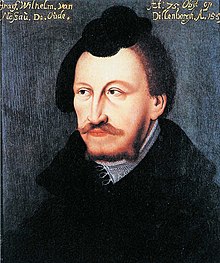
Back وليام الاول كونت ناسو ديلينبورج ARZ Вилхелм (Насау) Bulgarian Guillem de Nassau-Dillenburg Catalan Vilhelm 1. af Nassau-Dillenburg Danish Wilhelm (Nassau) German Γουλιέλμος Α΄ του Νάσσαου-Ντίλενμπουργκ Greek Guillermo I de Nassau-Dillenburg Spanish Guillaume de Nassau-Dillenbourg French Willem de Rike fan Nassau-Dillenburg Frisian וילהלם הראשון, רוזן נסאו-דילנבורג HE
William I, Count of Nassau-Siegen | |
|---|---|
 Portrait by Dutch artist Johannes Tideman (1671) | |
| Count of Nassau-Siegen Count of Diez | |
| Coat of arms |  |
| Reign | 30 July 1516 – 6 October 1559 |
| Predecessor | John V |
| Successor | |
| Native name | Wilhelm I. Graf von Nassau-Siegen |
| Born | 10 April 1487 Dillenburg |
| Died | 6 October 1559 (aged 72) Dillenburg |
| Buried | Fürstengruft, Evangelische Stadtkirche, Dillenburg |
| Noble family | Nassau-Siegen |
| Spouse(s) | |
| Issue more... | |
| Father | John V |
| Mother | Elisabeth of Hesse-Marburg |
William I of Nassau-Siegen[note 1] (German: Wilhelm I. Graf von Nassau-Siegen; 10 April 1487 – 6 October 1559), nicknamed the Elder (German: der Ältere) or the Rich (German: der Reiche), was Count of Nassau-Siegen[note 2] and half of Diez from 1516 to 1559. He was a descendant of the Ottonian Line of the House of Nassau.
William's reign marked a notable period in the history of his house. During his reign, he introduced the Reformation in his territories,[1][2][3] and the saw expansion of his county's territorial possessions. He promoted the Lutheran faith and played a key role in the political events of his time, including involvement in the Schmalkaldic League and negotiations leading to the Peace of Passau. William advanced the interests of his house through a policy of moderation, and contributed to its success.[4]
A major challenge throughout his reign was the succession dispute over the County of Katzenelnbogen, which was contested by the Landgraviate of Hesse. This dispute was known as the War of the Katzenelnbogen Succession.[5][6][7]
William was described as calm and persistent. He maintained firm religious convictions, and was resolute in asserting his rights in the Katzenelnbogische Erbfolgestreit.[8] Through his diplomatic skills, he earned numerous mediation assignments within the Holy Roman Empire.[9]
In Dutch history, he is primarily remembered as the father of Prince William the Silent.
Cite error: There are <ref group=note> tags on this page, but the references will not show without a {{reflist|group=note}} template (see the help page).